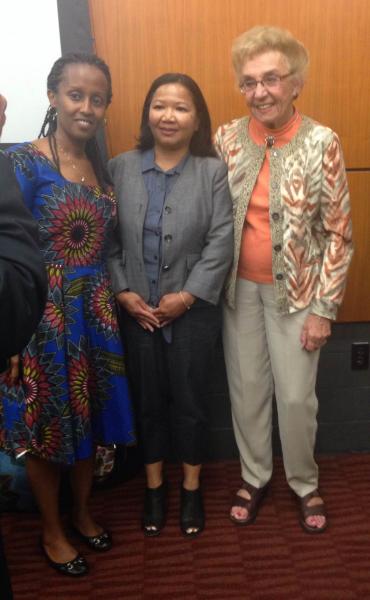Female Genocide Survivors Talk Forgiveness

Forgiveness was the conclusion at Tuesday's panel, hosted by the USC Shoah Foundation Student Association, that gave three female genocide survivors the platform to share their experiences.
Moderated by Executive Director Stephen D. Smith, the panel — titled “Women of the Holocaust, Cambodia, and Rwanda: Three Survivors in Conversation” — focused on Celina Biniaz, Sara Pol-Lim and Edith Umugiraneza's experiences as they endured their respective genocides.
Biniaz, an 82-year-old Holocaust survivor worked at one of Oskar Schindler’s factories. She was the youngest female on Schindler’s list. Sara Pol-Lim was a survivor of the Khmer Rouge Killing Fields in the Cambodian Genocide and came to the United States in 1983 without knowing a single word in English. And the third panelist, Edith Umugiraneza, witnessed the deaths of many of her family members and friends during the Rwandan Genocide. She now works at the USC Shoah Foundation to educate young people.
All three agreed that educating young people about genocide was extremely important.
“Fight bigotry, accept people for who they are, and to not hate,” said Biniaz. She also added that although there are many monuments dedicated to the Holocaust, the human voice is the most important.
“To me remembrance means prevention,” said Umugiraneza. She further explained that the only way to prevent tragedies like genocide is to educate young people.
The panel was asked about what it was like being a woman during times of genocide.
Biniaz explained that because she was 13 years old, she was lucky. Schindler needed someone with small hands. Many of the other female children were killed.
Pol-Lim said, “Women were more vulnerable than men.”
Every panel member had a strong mother. Pol-Lim said that her mother made her courageous and even saved her life.
Biniza reflected on something her mother said to her. “The world owes you nothing," she recounted. "You take what you are given, and you move forward.”
Each panel member agreed that the only way to get through the tragedy of experiencing something like genocide is forgiveness.
“It didn’t happen right away,” said Biniza. It took her 40 years to talk about what occurred during the Holocaust. She met a 19-year-old nun who helped her get rid of a lot of her anger. Only after she spoke to Steven Spielberg for his movie "Schindler's List" did she begin to talk about her ordeal.
“Schindler saved my life, but you gave me a voice,” Biniaz said to the director.
“You have to forgive or you cannot move forward," Biniaz said. "Have peace within yourself."
Reach Staff Reporter Kelly Masuda here.



